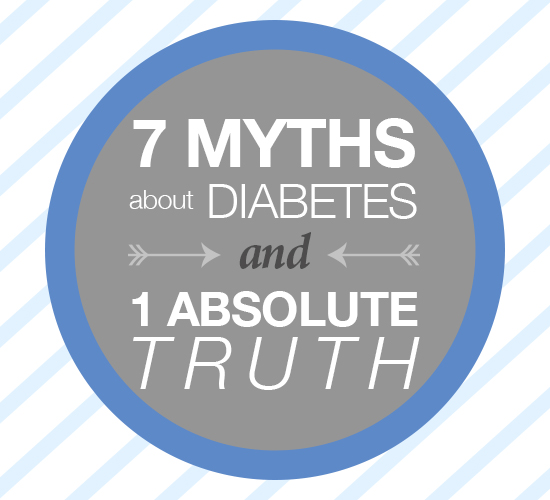Think you know all there is to know about diabetes? Think again.
Diabetes isn’t serious. That may depend on how you define “serious”. According to the American Diabetes Association, diabetes causes more deaths a year than breast cancer and AIDS—combined. It also aggravates other conditions that are also life threatening; two out of three diabetics die from heart disease or stroke. Just because diabetes is becoming increasingly more manageable doesn’t mean it’s not a serious condition with serious consequences.
Only overweight or obese people get diabetes. This myth is a strong one, particularly for those of normal weight who get diagnosed with the disease. Where genetic disposition and unknown triggering factors cause Type 1 diabetes, Type 2 adds lifestyle factors into the equation. In fact, most overweight people never develop Type 2 diabetes as weight is only one of many risk factors.
Sugar causes diabetes. Another common myth, sugar is often associated with diabetes because it’s a disease involving high blood sugar. While having a diet high in sugar can raise blood sugar, diabetes is a metabolic disease that involves the inability to produce the appropriate amount of insulin to handle the glucose. In this case, it’s not the sugar that causes diabetes; other risk factors, like genetics and prolonged obesity, cause the body to react to the sugar inappropriately.
Diabetes is contagious. To put it simply, diabetes is not contagious. It may feel that way, when several members of a family are diagnosed, but that is a result of genetics, not poor hand washing.
A diabetic diet is complicated and hard to maintain. The real myth here is that diabetic diet is different from what everyone should be eating. We all should have a meals filled with fresh produce, whole grains, plenty of water, and we all should limit our intake of saturated and trans fat, salt, sugar, and processed foods. It isn’t a diabetic diet. It’s just good nutrition.
You can “cure” diabetes with lifestyle changes. This is a little complicated. Diabetes, particularly Type 2, is a progressive disease, but it can go into remission if active steps are taken to manage blood sugar. This means checking glucose levels frequently, maintain good exercise, sleep, and nutrition, and limiting stress (and all the detrimental health decisions that go with it). Reaching and sustaining a healthy weight is a strong part of this equation; many people see their blood sugar control improve drastically, reducing their need for medications.
Needing insulin means you aren’t taking care of your diabetes properly. Another important myth to debunk, the requirement of insulin doesn’t reflect a persons inability to cope with the disease. Diabetes progresses differently from person to person, and adding insulin to the regimen when it is needed is a result of what the body requires, not what the person has “done” to it. It’s all about keeping the body running smoothly. When the body can no longer maintain normal glucose levels with oral medications, then insulin provides the additional help.
And here’s the truth: If you or a loved one have been diagnosed with diabetes, it’s important to be armed with hope, a supportive team, and the right information. You’ll find all of this at our annual Diabetes Wellness Fair, coming up on Saturday, October 11th from 10am to 1pm at the Sioux City Convention Center. Join us for free health screenings, diabetes management advice, diet and exercise tips, and great networking tools.


